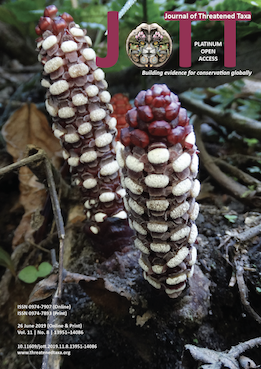On the importance of alpha behavior integrity in male Capybara Hydrochoerus hydrochaeris (Mammalia: Rodentia: Caviidae) following immuno-contraceptive treatment
DOI:
https://doi.org/10.11609/jott.4747.11.8.13967-13976Keywords:
Agonistic behavior, Brazilian spotted fever, Gonacon, Rickettsia, secondary sexual characteristics, wildlife population controlAbstract
As the human population continues to grow, habitat for wildlife shrinks, driving fauna either into extinction or into new habitats, which can create new problems. In Brazil, the Capybara Hydrochoerus hydrochaeris has become a pest by invading urban and agricultural areas. These mammals quickly multiply owing to abundant food supply and a lack of natural predators, and they can serve as amplifying hosts for Rickettsia rickettsii, the pathogen of potentially life-threatening Brazilian spotted fever. Species-specific population management strategies that respect public opinion and consider animal welfare are required for the effective mitigation of this tick-borne zoonotic disease. In order to control Capybara populations it is necessary to take into account their social dynamics, which are centered on polygynous dominant males with hormone-driven secondary sexual characteristics. To be a viable management tool, a contraceptive strategy targeting these males must preserve their social status to prevent other males from replacing them. As part of a larger research project on the efficiency of anti-Gonadotropin-releasing hormone (GnRH) vaccine treatment in free-ranging Capybaras, the aim of this study was to observe the impact of this treatment on alpha male and overall social group behavior. At the end of the 18-month-study, there were no recorded births involving the immunized animals, and alpha male sexual characteristics and group integrity were preserved. These results encourage the use of this anti-GnRH vaccine as an alternative population control tool in male Capybara.
Published
Issue
Section
License
Authors own the copyright to the articles published in JoTT. This is indicated explicitly in each publication. The authors grant permission to the publisher Wildlife Information Liaison Development (WILD) Society to publish the article in the Journal of Threatened Taxa. The authors recognize WILD as the original publisher, and to sell hard copies of the Journal and article to any buyer. JoTT is registered under the Creative Commons Attribution 4.0 International License (CC BY), which allows authors to retain copyright ownership. Under this license the authors allow anyone to download, cite, use the data, modify, reprint, copy and distribute provided the authors and source of publication are credited through appropriate citations (e.g., Son et al. (2016). Bats (Mammalia: Chiroptera) of the southeastern Truong Son Mountains, Quang Ngai Province, Vietnam. Journal of Threatened Taxa 8(7): 8953–8969. https://doi.org/10.11609/jott.2785.8.7.8953-8969). Users of the data do not require specific permission from the authors or the publisher.





